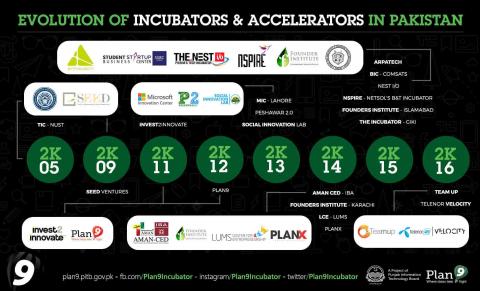
Overview – 6 years ago vs. today
Today the entrepreneurial eco-system of Pakistan is at a junction. With the collective mindset changing and an increased interest to test the entrepreneurial ground we can expect to see exciting times ahead. We can see a visible increase in the success rate of startups and some of the best ideas coming out at this time, this industry is set to start making its mark in the global map.
It should be noted that the accelerated growth that has taken place has happened in the last 6 years. Prior to the growth spurt, one could count the startups operating on their fingertips. Today, however, we see startup success stories coming out of every nook and corner of the nation. A country that had little awareness about entrepreneurship as a branch is now pushing out more and more innovations and aspiring entrepreneurs. This country is home to names like Rozee.pk, Zameen.com, PakWheels.com to name a few. It would not be an exaggeration to call entrepreneurship the new vogue. This growth in entrepreneurship industry can be credited to some players of the industry who have set the foundation for future growth that is to come.
It is time to acknowledge the unsung heroes who have positively impacted this industry for the better and to give them their due as well as celebrate their contribution to an industry that is set to pave way for more opportunities.
With more awareness about the resources that are now available for the players in the industry, we can increase the stakeholders that can end up growing the industry further.
Incubators and Accelerators in Pakistan – A History
It would be wrong to say that the industry is at the epitome of its growth. The startup culture in Pakistan is still relatively nascent and is paving its way to more structure. A startups journey has never been an easy one and even with the 6 years of accelerated positive growth, it is a difficult space to work in.
The boost in startup success patterns can be accounted to incubators and accelerators and the facilitation that they provide to the innovation that is testing new ground and working on its survival. With the constant presence of mediating factors that are playing their part in impacting the smooth sailing of the startups, incubators and accelerators do provide a cushion or an umbrella to them.
The overall incubator/accelerator culture globally is rising and Pakistan is also experiencing a similar growth graph. Today with over 20 incubators and accelerators operating in this space and countless startups coming out, Pakistan can be home to some of the most innovative solutions in the times to come. All the incubators currently present in the nation have different cultures in place as well as varied selection criteria. This variation also results in more depth and dimension to the innovation that is coming out of the nation.
The I/A Timeline
Kick-starting this culture we had The Incubation Center, NUST. Set up in 2005, this incubator took the first step to facilitate the industry as well as create a link between the startup world and the academic world. The Social Entrepreneurship and Equity Development (SEED Ventures) was set up in 2009 and with a focus on the social elements of things they are providing a platform for the use of entrepreneurship to boost the economy as well as create a social impact. This was followed by the setting up of the virtual accelerator Invest2Innovate. With a four-month acceleration program in place i2i provides business support and access to mentors and investment to mid-stage startups. It wasn’t till 2012 that the eco-system of incubators saw a major boost. This boost came in the form of the establishment of Plan9, a project of Punjab Information Technology Board. This initiative has produced over 120 startups and is well into its 9th cycle of incubation.
Dr. Umar Saif, Chairman PITB, while talking about the entrepreneurial ecosystem flourishing in Pakistan stated: “What started with a couple incubators initially has now spread like a wildfire and I can foresee the economy of Pakistan booming to new heights.”
2013 saw 3 more incubators entering the space. Microsoft Innovation Center, Peshawar 2.0 and Social Innovation Lab all working in varied domains and targeting different geographic regions are now an integral part of the industry.
2014 was also a year of accelerated activity with incubators like Aman Center for Entrepreneurial Development, Founders Institute (Karachi) and LUMS Center for Entrepreneurship being set up. The year also saw the establishment of the accelerator PlanX, initially a project of PITB which was converted to a project of MIT Enterprise Forum.
2015 was a busy year. We had Incubators and Accelerators being set up all over Pakistan including Arpatech, Business Incubation Center (COMSATS), The Nest i/o, Nspire (Netsol’s Business and Technology Incubator), Founders Institute (Islamabad), The Incubator, GIKI.
Jehan Ara, President at P@sha and Nest i/o at the launch of Nest i/o said: “It will provide a home for talented entrepreneurs and for showcasing innovative products to potential investors and customers”.
2016 saw the establishment of Team Up and Telenor Velocity.
Setting Incubators at the source
Entrepreneurship was an alien concept a mere couple of years back. A country that has a relatively restricted mindset, would require a change at the base level. However, the last couple of years have witnessed ground-breaking change. With more and more educational institutions inculcating the concept of thinking-outside-the-box in their curriculum, we see slow but impactful change.
Entrepreneurship is a young person’s game and for that reason we see more and more university students testing the entrepreneurial ground. With incubators being set up within the university premises, the startups can get on-premise support that can increase their chances to get a more firm footing when they step into the professional world.
Today we have model incubators in close proximity with LUMS, ITU, NUST and others. A number of universities are also providing working spaces for startups to operate in. This trend is not only facilitating the industry but rather pushing more of the youth to test this new ground.
Investors
Investors are the Promised Land for any startups. Let us not kid ourselves, we all want the green in the end. It is a quest to find the right investor who believes in the vision of your startup and all that it aims to be. With more people testing this space and an overall positive attitude to invest in startups by the ones who have the cash, the overall chances of survival for a startup are increasing.
What the future holds
Now with 3 months into the year 2017 and a happening year behind us we feel the ever growing entrepreneurial eco-system of Pakistan needs to be celebrated. We feel 2017 is going to mean bigger and better things for the entrepreneurs coming out of the nation and the players that have played a significant role in setting the foundation for future growth that is anticipated in the coming times need to be given their due. Let’s welcome the future with more positivism and the hope to see unicorns come out of this nation.
When in conversation with Nabeel A. Qadeer, Director Entrepreneurship and Enterprise Development, PITB on how he sees this ecosystem flourishing, he said: “With investors showing more faith in Pakistani startups, this startup ecosystem is bound to grow to its full potential in the coming years.”

